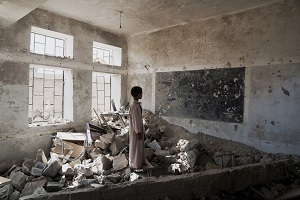In Yemen, children’s education devastated after three years of escalating conflict
Nearly 2 million children now out of school
Nearly half a million children have dropped out of school since the 2015 escalation of conflict in Yemen, bringing the total number of out-of-school children to 2 million, according to a UNICEF assessment released on May 27, 2018. Meanwhile, almost three quarters of public school teachers have not been paid their salaries in over a year, putting the education of an additional 4.5 million children at grave risk.

A student stands in the ruins of one of his former classrooms, which was destroyed in June 2015, at the Aal Okab school in Saada, Saada Governorate, Yemen, Monday 24 April 2017.
“An entire generation of children in Yemen faces a bleak future because of limited or no access to education,” said Meritxell Relaño, UNICEF Representative in Yemen. “Even those who remain in school are not getting the quality education they need.”
According to “If Not In School”, more than 2,500 schools are out of use, with two thirds damaged by attacks, 27 per cent closed and 7 per cent used for military purposes or as shelters for displaced people.
The journey to school has also become dangerous as children risk being killed en route. Fearing for their children’s safety, many parents choose to keep their children at home. The lack of access to education has pushed children and families to dangerous alternatives, including early marriage, child labour and recruitment into the fighting.
Additional findings of If Not In School include:
• At least 2,419 children have been recruited in the fighting since March 2015;
• A 2016 survey across six governorates revealed that close to three quarters of women had been married before the age of 18, while nearly half had been married before age 15;
• Up to 78 per cent of all Yemenis live in poverty: 80 per cent need some form of social protection support including cash assistance;
• An estimated 1.8 million children under 5 years and 1.1 million pregnant or nursing women are acutely malnourished, representing a 128 per cent increase since late 2014;
• 16 million Yemenis, including close to 8.2 million children, need humanitarian assistance to establish or maintain access to safe drinking water and adequate sanitation;
• The number of people needing help to access healthcare has more than tripled – from 5 million before the war to 16 million today.
On behalf of Yemen’s children, UNICEF appeals to the warring parties, those who have influence on them, government authorities and donors to:
Put an end to the war and all grave violations against children: Peace and recovery are an absolute must if children in Yemen are to resume their schooling and get the quality education they urgently need and are entitled to.
Pay teachers: Education authorities across Yemen should work together and find an immediate solution to provide salaries for all teachers and education personnel so that children can continue to learn.
Protect children’s education unconditionally: All parties to the conflict and those with influence on them need to unconditionally commit to stopping attacks against schools to protect children’s education across Yemen. Children and education staff must be kept out of harm’s way and schools must be maintained as safe zones for learning.
Increase funding for education: The international community, donors and development partners should support incentives for teachers while searching for long-term solutions to the salary crisis in Yemen, and continue supporting the education system.
Source:United Nations Children's Fund
- 240 reads
Human Rights
Ringing FOWPAL’s Peace Bell for the World:Nobel Peace Prize Laureates’ Visions and Actions

Protecting the World’s Cultural Diversity for a Sustainable Future

The Peace Bell Resonates at the 27th Eurasian Economic Summit

Declaration of World Day of the Power of Hope Endorsed by People in 158 Nations

Puppet Show I International Friendship Day 2020

